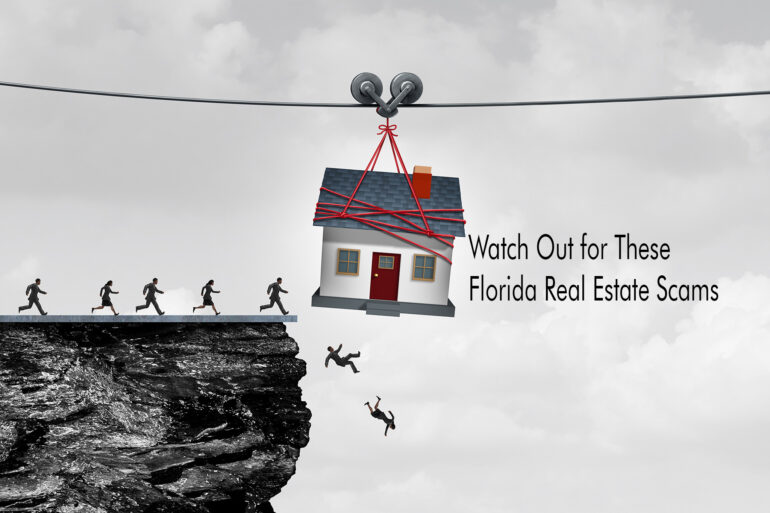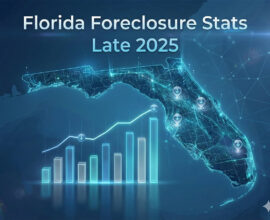Watch Out for These Florida Real Estate Scams
Florida real estate prices jumped 23.9% over the past year, demonstrating the Sunshine State’s growing appeal. Many people see owning a home as part of the American Dream, and more people want to own homes in Florida. Unfortunately, malicious actors have noticed these trends and have swindled families through elaborate home fraud schemes.
Some criminals steal homes from rightful heirs using intricate documents and systems. Other criminals receive payments for homes they don’t own. Florida has great things to offer, but you have to watch out for scams. We will share how these Florida real estate scams work and how to protect yourself.
How Scammers Steal Inheritance
When someone dies, the probate courts review the will and distribute assets to heirs. Some scammers forge important documents and claim themselves as the owners and rightful heirs of the property. Scammers then get the homes and sell them for a profit.
Two Cooper City women ran an elaborate scam where they illegally obtained at least 67 homes. Although they were recently caught and put in prison, over 20 homes were past the statute of limitations. The two women made over $500,000 in profits from illegal home sales.
These scammers target vulnerable heirs who may not know the home’s worth. For some of their schemes, they found a desperate person who had the same name as the deceased homeowner. Last names like Smith are common, and scammers will look for former criminals with that last name. Fake heirs receive a small payment while the masterminds receive the bulk of the proceeds.
Some scammers reach out to the heirs and get them to accept a fraction of what the home was worth. Most of these heirs are financially desperate.
Scammers filter their search to find properties with unpaid property taxes. They hope the homeowner is deceased and the rightful heir is in a similar financial pinch. These people may happily take any money they can get, even if it puts them in a disadvantageous position.
How to Avoid These Scammers
Scammers stealing properties rely on financial desperation and the rightful heirs not knowing the full story about the property. You should stay in frequent communication with your family and discuss how your parents will distribute their assets. It’s not the most enjoyable conversation to have in the moment, but it can clarify who is supposed to get which assets.
Knowing the property’s value and settling the heir distribution quickly after death will keep scammers away. Property scammers target homes with mounting property taxes and hope people will forget or not care about their thievery.
How Scammers Make Money on Other People’s Properties
Imagine you buy a house or pay for a month’s rent. You show up eager to settle in and turn the space into your new home. However, there’s one problem: the owner never agreed to this deal. Not only that, but the owner doesn’t even know you.
Some real estate scammers list properties for sale and rent on real estate websites. These scammers use fraudulent websites, company names, identities, and email addresses that appear legitimate. The scammer disappears after receiving the funds, leaving the buyer in a state of shock upon learning the truth.
Two women, aged 20 and 22, used this scheme to make over $300,000. Their efforts covered six Florida counties during the booming housing market. They posed as title agents when the victim was ready to pay up. Scammers are smart and malicious, but these scammers’ ages reveal the narrowing barrier to entry.
How to Avoid These Scammers
The real estate boom created a buying frenzy for Florida real estate. Long-term investors got rewarded as people fled expensive states like New York and California for the Floridian coastline.
As housing prices continued to climb, more people rushed to buy homes unseen. People got more comfortable buying products and services without seeing them in a store. For some people, that comfort transitioned into real estate properties. Some homebuyers didn’t want to travel during the pandemic and opted to buy homes without seeing them.
Buying homes without seeing them can work well. Seasoned investors look at statistics when deciding which homes to buy. Some people have been to Florida several times for vacation and already know the best areas. Not every sight unseen purchase is a scam, but you’ll have to be extra careful.
Review email addresses to make sure they are legitimate. Some scammers trying to imitate PayPal send an authentic-looking email, but the sender doesn’t have PayPal.com as the email domain. Some scammers will fake the identities of legitimate companies but have a discrepancy in the email address.
The two scammers in this case also posed as title agents. You should research title agents and companies before working with them to make sure they are legitimate. Requesting a video call will confirm if the person you’re talking with is the title agent or a scammer.
A title agent will accommodate a video conferencing call if it helps them get the sale. Scammers will discourage a video conferencing call since it would expose them. You can also look up the title agent and reach out on a social media platform they use. You can ask if the title agent received your social media message in one of your email correspondences.
If the title agent says no, ask them to check the direct messages. Crickets at that stage of the game may mean a scammer tried to steal your money.
Protecting Yourself from Scammers
Florida real estate scammers take advantage of many people. Staying educated and asking questions can reduce the likelihood of getting scammed. Scammers use many strategies that go beyond real estate to deceive their victims. They take advantage of people’s emotions during a moment when they either have little time to think it over or are desperate.
The scammers stealing inheritances took advantage of elderly and financially desperate individuals. They went undetected for at least seven years since the statute of limitations took effect on some of their transactions.
The scammers who made money on other people’s properties took advantage of people who needed to make quick decisions. Florida’s hot real estate market led to quick purchases and bidding wars. This high demand environment made some buyers more susceptible to scammers.
If something seems odd or too good to be true, question it and take your time. You should do your research on a company and read online reviews before doing business with them. It’s a red flag if someone asks for a large payment in an anonymous cryptocurrency like Bitcoin.
Even if you catch a scammer, this individual will continue targeting unsuspecting victims. The recently caught Florida real estate scammers didn’t have any desire to stop until the authorities arrested them. You should report any malicious behavior to local authorities to get them in the loop. The authorities can lure the scammers and make sure they don’t target other victims.








